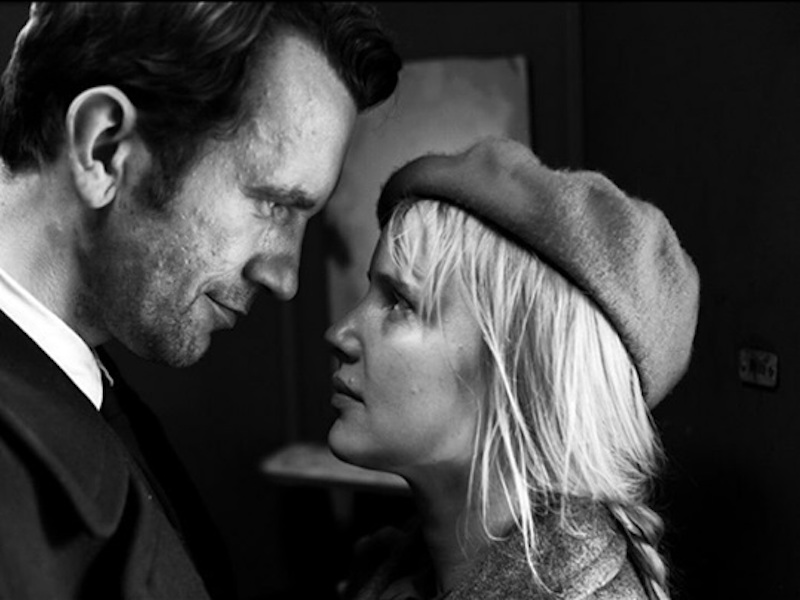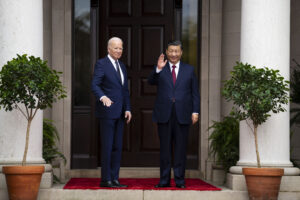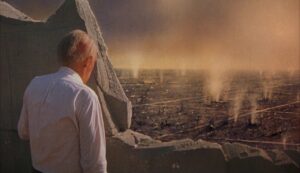‘Cold War’ Way Sexier Than Actual Cold War
Filmmaker Pawel Pawlikowski’s love-on-the-run tale in the era of comrades and Coltrane is a melancholy homage to his parents. Getting warmer: Tomasz Kot and Joanna Kulig get close in Pawel Pawlikowski's "Cold War." (IMDb)
Getting warmer: Tomasz Kot and Joanna Kulig get close in Pawel Pawlikowski's "Cold War." (IMDb)
Filmmaker Pawel Pawlikowski left Poland in the 1980s, settling in England where he plied his craft, eventually pairing up with English-born playwright Rebecca Lenkiewicz. His first films were documentaries for British television, followed by unremarkable turns at feature filmmaking. “My Summer of Love,” with Emily Blunt, came out in 2004, followed in 2011 by the French thriller, “The Woman in the Fifth,” with Ethan Hawke and Kristin Scott Thomas and a striking Polish blond named Joanna Kulig.
In 2013, Pawlikowski returned to Poland and shot “Ida,” about a nun who travels to her hometown to uncover a family secret that speaks to the core of her identity–she is Jewish. Shot in sumptuous black and white using 4:3 (squarish) aspect ratio, “Ida” represented a stylistic break for the director, and it won him an Oscar for Best Foreign Language film.
In theaters Dec. 21, his new movie, “Cold War,” continues in the vein of “Ida,” as it too is in black and white with a 4:3 aspect ratio, and has been submitted by Poland for Oscar consideration. Inspired by Pawlikowski’s late parents, for whom the characters, Zula (Joanna Kulig) and Wiktor (Tomasz Kot), are named and to whom the film is dedicated, identity is at the core of this lugubrious love story.
It begins with people singing, a montage of faces caught mid-tune, each cut before any melodic momentum is achieved. If it feels like work, that’s because it is the work of Wiktor, a musician, and his partner, TV producer Irena (Agata Kulesza). They are putting together a folk troupe, based on the real-life Mazowsze group, still performing today since its beginnings in the wake of World War II.
Wiktor and Irena are auditioning country girls singing folk songs, but one look at Zula and Wiktor knows she isn’t from the country. And the fact that she served time for stabbing her overly attentive father only further intrigues him. She chooses to sing “Hearts,” a love song from a Russian movie. It’s hardly a folk song, but it hardly matters. She is cast and the troupe is a hit. Its jammed touring schedule is breathlessly captured in silvery black and white night shots and a string of performance snippets, almost as breathless as the flailing sex on the go between Wiktor and Zula.
Caught in a semi-public space with limited time and the feeling overtaking them, Zula tells him, “Let’s do it,” and Pawlikowski abruptly cuts to swishing skirts at the head of the following dance number. It’s edits like this and the natural marriage between bluesy jazz tunes like “Is You Is Or Is You Ain’t My Baby” and cinematographer Lukasz Zal’s lustrous imagery that imbue Pawlikowski’s star-crossed lovers with the grit of tragedy beneath the gloss of a unified aesthetic.
In the years following the war, Communists took over the Polish government under the Red Army, the Soviet secret police and the NKVD (People’s Commissariat for Internal Affairs). Polish resisters of Nazi rule were found guilty of dubious charges under the Soviets, and executed to spare the new occupiers a resurgent resistance.
In the film, Stalin’s shadow falls across the land and the troupe is requested to sing inspirational songs in praise of land reform and other agenda items, a suggestion their toady manager, (Borys Szyc), readily agrees to. And, if they know what’s good for them, so do Wiktor and Irena. The final nail comes as a banner portrait of the Russian leader is unfurled behind them accompanied by coerced and thunderous applause at the end of a performance.
But still the troupe’s popularity grows and soon they are touring to Eastern bloc cities like Berlin, where an opportunity to escape presents itself. One seizes it, the other doesn’t, but they soon meet up in Paris, united in a jazz band, Zula singing show-stopping torch songs while Wiktor and his band play behind her.
With new songs come new lyrics, care of Parisian poet and vixen to Wiktor, Juliette (Jeanne Balibar). Zula and Wiktor argue and soon it’s all over between them, only it isn’t, of course. As with Pawlikowski, whose sojourn in the West brought him a career and good fortune, all roads lead back to the Fatherland. In the end, Zula and Wiktor spend the rest of their lives together in a way that defies the happy ending implied.
The Poland that Pawlikowski Pleft in the 1980s, with the Solidarity movement in full swing and Soviet influence crumbling, must have been a place of optimism and hope in the frenetic demonstrations and vibrant chaos of positive change. The Poland he returned to, to make “Ida,” was a country that had adopted democracy and seemingly found it wanting as the openly authoritarian Law and Justice Party was in ascension, eventually taking over state broadcaster, Telewizja Polska, and packing the Polish Supreme Court.
It’s not difficult to find parallels between what Pawlikowski found in his home country and the identity crisis confronting Ida, the Jewish nun, or the existential funk of Zula and Wiktor, two expats clinging to their love because it’s all they have to cling to. There is passion in “Cold War,” not sensual but raw. Their joinings are like slacking thirsts, clamoring for what they can because a love that isn’t ill-fated is beyond their reach. Pawlikowski uses minimal camera movement, relying on jazz compositions and Zal’s off-balance framing to capture the fatalistic mood of the piece.
A subtly expressive actor, Kot internalizes Wiktor, his love and commitment to two things only: his music and Zula, personified in a brooding, cerebral portrayal. Kot moves through the movie like a condemned man, even when he crosses to the West. Happiness is nowhere to be found, not even with Zula, though his scenes with her tend to be the least joyless. Their love is more like a compulsion, a part of themselves they cannot let go. They hold and kiss each other ravenously, sharing everything but a smile.
While Wiktor smolders, Zula burns. It is precisely this fire that captivates him. Kulig dominates the movie with an irrepressible presence and a sultry power, a woman who is vulnerable, confident and, in the end, confounded by a relationship that has come to dominate her existence. She keeps coming back to him until she doesn’t, because while she would give her life for him, her dignity is too much to sacrifice.
By downplaying the romance and not accompanying each embrace with a swelling saxophone, Pawlikowski paradoxically makes “Cold War” even more romantic. The settings only emphasize the feelings of irretrievable loss, the disintegration of hope along with fortunes, friends, loved ones and feelings, and with them the blanching of self. While hardly a political film, “Cold War” exists firmly within the iron grasp of politics. Love in confinement is joyless, but even joyless love is better than none at all.
Your support matters…Independent journalism is under threat and overshadowed by heavily funded mainstream media.
You can help level the playing field. Become a member.
Your tax-deductible contribution keeps us digging beneath the headlines to give you thought-provoking, investigative reporting and analysis that unearths what's really happening- without compromise.
Give today to support our courageous, independent journalists.






You need to be a supporter to comment.
There are currently no responses to this article.
Be the first to respond.